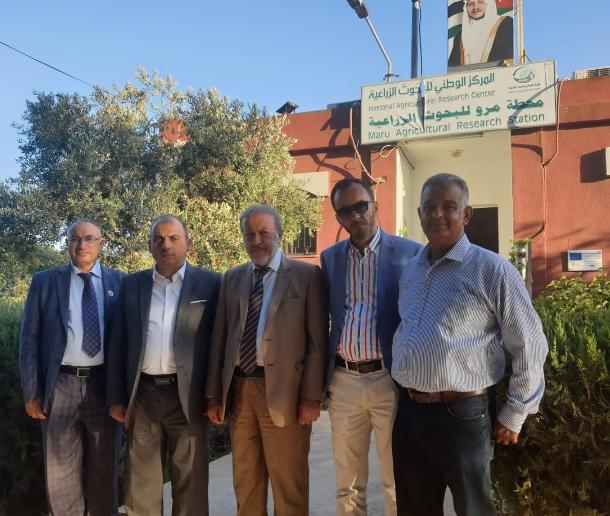- Local News
- Sat-2022-07-30 | 08:38 pm

Nayrouz News Agency :
Greater Irbid Municipality Givernor Eng. Nabeel Kofahi visited Maru Agricultural Research Station to have a closer insight on the station's activities conducted and the outputs of scientific research.
Dr. Nizar Haddad, the Director General of the National Agricultural Research Centre (NARC), welcomed the governor's visit and confirmed the openness of NARC and its research stations, to all institutions in Jordan, municipalities in particular, for having mutual fields of interest, especially in rural women's empowerment, laboratory services, community responsibility, in addition to environmental services such as rodent and insect control, agricultural libraries, media, gardening, and climate change.
Haddad said that NARC had played a prominent role in supporting and assisting several municipalities in Jordan to provide services of rodent and insect control, training, and capacity building, not to forger NARC’s distinguished efforts during the Corona pandemic, where NARC assisted with a new technology in sanitizing public institutions and places in many municipalities of Irbid, Ajlun, Balqa'a, and Amman; as well as, the southern governorates in corporation with the research centers spread throughout Jordan. In addition to integrating innovation and creativity, embracing entrepreneurs in the agricultural Incubator and transforming their ideas into real projects.
During the visit, Haddad expressed NARC’s willingness to cooperate with Irbid municipality with the provision of laboratory services with reasonable prices, and inform farmers and the private sector of the scientific research outputs and the most important modern technologies. Furthermore, NARC will give a chance to associations in Irbid to take part in the National Olive Festival, in addition to providing a specialized agricultural program through Irbid municipal radio.
Kofahi expressed his admiration on the work implemented at Maru Agricultural Research Station. He said that "at the Greater Irbid Municipality, we endeavor to strengthen the trust of citizens and donor institutions in municipal action through the cooperation and networking with national institutions, the development of strategic, operational, and executive plans, as well as, the automation of work, the distribution of tasks and the development of awareness".
He added that "The monopoly of power does not mean the monopoly of knowledge, so we seek to provide people with the most important data and knowledge, and activate partnerships with the private sector and consolidate values of justice, transparency, the issue of women's empowerment, especially in the areas of rural development and prioritization of expenditure".
In conclusion of the visit, the two parties agreed to frame the anticipated joint collaboration in an agreement.









